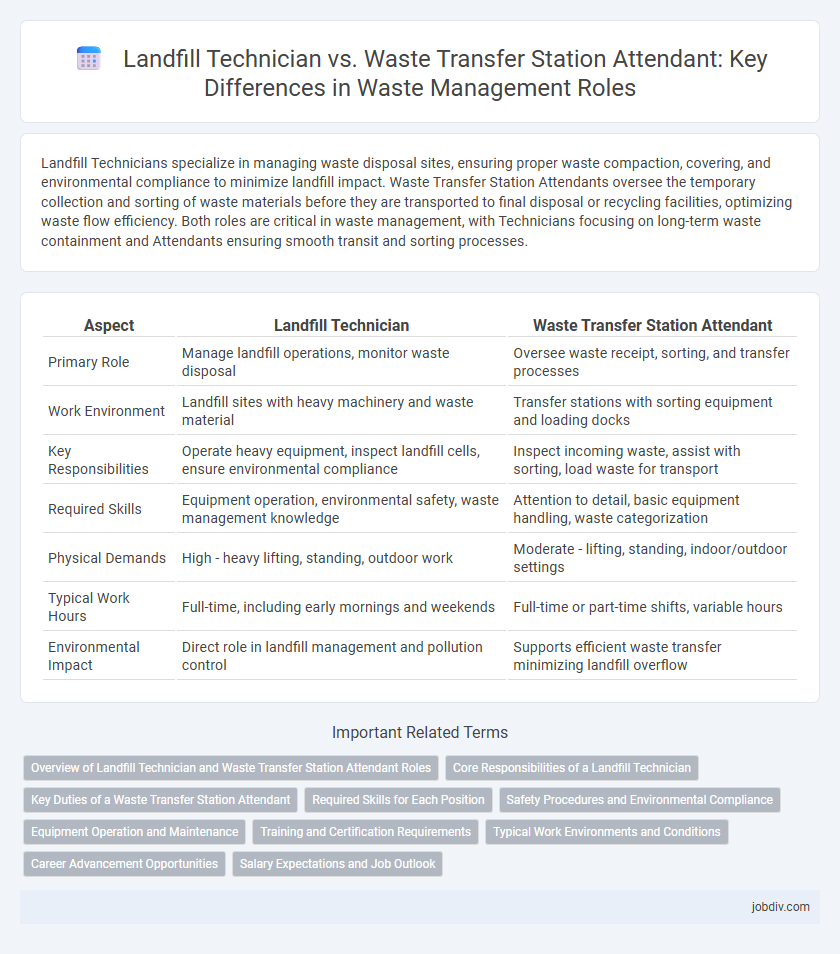Landfill Technicians specialize in managing waste disposal sites, ensuring proper waste compaction, covering, and environmental compliance to minimize landfill impact. Waste Transfer Station Attendants oversee the temporary collection and sorting of waste materials before they are transported to final disposal or recycling facilities, optimizing waste flow efficiency. Both roles are critical in waste management, with Technicians focusing on long-term waste containment and Attendants ensuring smooth transit and sorting processes.
Table of Comparison
| Aspect | Landfill Technician | Waste Transfer Station Attendant |
|---|---|---|
| Primary Role | Manage landfill operations, monitor waste disposal | Oversee waste receipt, sorting, and transfer processes |
| Work Environment | Landfill sites with heavy machinery and waste material | Transfer stations with sorting equipment and loading docks |
| Key Responsibilities | Operate heavy equipment, inspect landfill cells, ensure environmental compliance | Inspect incoming waste, assist with sorting, load waste for transport |
| Required Skills | Equipment operation, environmental safety, waste management knowledge | Attention to detail, basic equipment handling, waste categorization |
| Physical Demands | High - heavy lifting, standing, outdoor work | Moderate - lifting, standing, indoor/outdoor settings |
| Typical Work Hours | Full-time, including early mornings and weekends | Full-time or part-time shifts, variable hours |
| Environmental Impact | Direct role in landfill management and pollution control | Supports efficient waste transfer minimizing landfill overflow |
Overview of Landfill Technician and Waste Transfer Station Attendant Roles
Landfill Technicians manage the daily operations of landfill sites, ensuring proper waste disposal, environmental compliance, and equipment maintenance to prevent contamination and hazards. Waste Transfer Station Attendants coordinate the sorting, loading, and transfer of waste materials between collection vehicles and transport trucks, optimizing efficiency and safety in waste handling. Both roles are crucial for effective waste management, with Landfill Technicians focusing on site maintenance and regulatory adherence, while Transfer Station Attendants emphasize waste sorting and logistics.
Core Responsibilities of a Landfill Technician
Landfill Technicians are responsible for monitoring landfill operations, ensuring environmental compliance, and conducting regular inspections to prevent contamination and manage waste disposal efficiently. They operate heavy machinery to compact and cover waste, maintain accurate records of landfill activities, and implement safety protocols to protect workers and the environment. Their role contrasts with Waste Transfer Station Attendants, who primarily oversee the receipt, sorting, and temporary storage of waste before it is transported to disposal or recycling facilities.
Key Duties of a Waste Transfer Station Attendant
Waste Transfer Station Attendants manage the efficient unloading, sorting, and temporary storage of waste materials before transfer to landfill sites or recycling centers, ensuring compliance with environmental regulations. They operate heavy machinery such as compactors and loaders, monitor incoming waste loads, and document waste volumes to optimize facility operations. Unlike Landfill Technicians who focus on landfill maintenance and gas monitoring, Transfer Station Attendants prioritize waste consolidation and public interaction.
Required Skills for Each Position
Landfill Technicians require skills in heavy equipment operation, environmental monitoring, and waste compaction techniques to ensure efficient and safe landfill management. Waste Transfer Station Attendants need expertise in sorting recyclable materials, operating baling machines, and maintaining proper safety protocols for handling diverse waste streams. Both positions demand strong knowledge of environmental regulations and commitment to workplace safety standards.
Safety Procedures and Environmental Compliance
Landfill Technicians enforce strict safety procedures, including hazardous waste handling and daily equipment inspections, to prevent environmental contamination and comply with EPA regulations. Waste Transfer Station Attendants prioritize sorting and compacting waste while monitoring for hazardous materials to minimize risks and maintain local environmental standards. Both roles require adherence to OSHA guidelines and proper reporting protocols to ensure workplace safety and reduce ecological impact.
Equipment Operation and Maintenance
Landfill technicians specialize in operating heavy machinery such as compactors, bulldozers, and excavators to manage waste burial and cover processes, ensuring optimal site functionality and environmental compliance. Waste transfer station attendants handle the operation and routine maintenance of conveyor belts, balers, and compactors to efficiently sort and prepare waste for transportation. Both roles require expertise in equipment troubleshooting and preventive maintenance to minimize downtime and maintain safety standards.
Training and Certification Requirements
Landfill Technicians typically require certification in hazardous waste operations (HAZWOPER) and specialized training in landfill gas monitoring, leachate management, and compactor operation to ensure environmental compliance. Waste Transfer Station Attendants often need training in material handling, traffic control, and safety protocols specific to waste sorting, with certifications such as OSHA general industry safety or forklift operation being common. Both roles prioritize safety and environmental training, but Landfill Technicians demand more technical and regulatory certification focused on landfill operations and contamination prevention.
Typical Work Environments and Conditions
Landfill Technicians typically work outdoors in environments with heavy machinery, odors, and potential exposure to hazardous waste materials, requiring protective gear and physical stamina. Waste Transfer Station Attendants operate in semi-enclosed or indoor facilities where waste is sorted and compacted, facing loud noise levels and strict safety protocols. Both roles demand adherence to environmental regulations and maintenance of cleanliness to prevent contamination and health risks.
Career Advancement Opportunities
Landfill Technicians often gain expertise in waste management operations and environmental compliance, positioning them for advancement into supervisory roles or environmental safety specialist positions. Waste Transfer Station Attendants develop skills in logistics and equipment handling, which can lead to opportunities in operations management or equipment maintenance supervision. Both career paths offer unique advancement opportunities, with Landfill Technicians leaning more toward regulatory and environmental roles, while Transfer Station Attendants advance through operational management tracks.
Salary Expectations and Job Outlook
Landfill Technicians typically earn an average salary ranging from $35,000 to $50,000 annually, while Waste Transfer Station Attendants usually make between $30,000 and $45,000 per year. The job outlook for both roles is steady, driven by ongoing waste management needs and increased emphasis on environmental regulations. Employment growth for these positions is projected to remain stable through 2030, with Landfill Technicians experiencing slightly higher demand due to specialized operational skills.
Landfill Technician vs Waste Transfer Station Attendant Infographic

 jobdiv.com
jobdiv.com